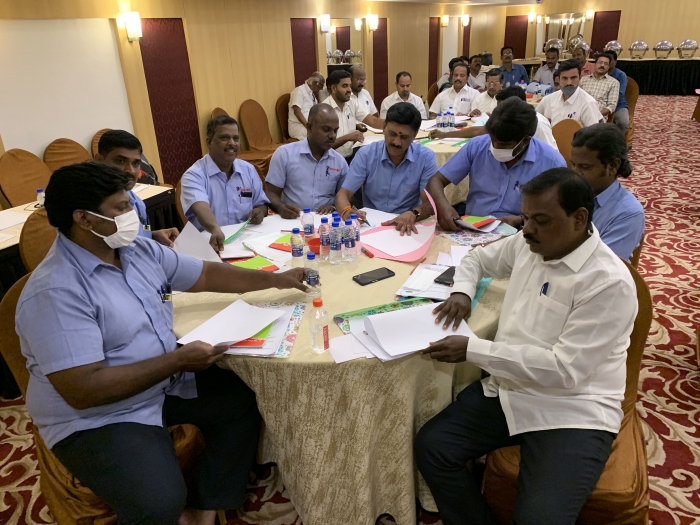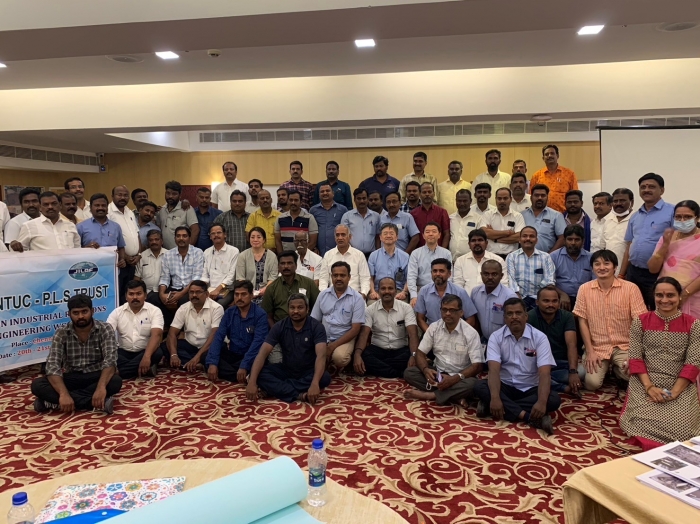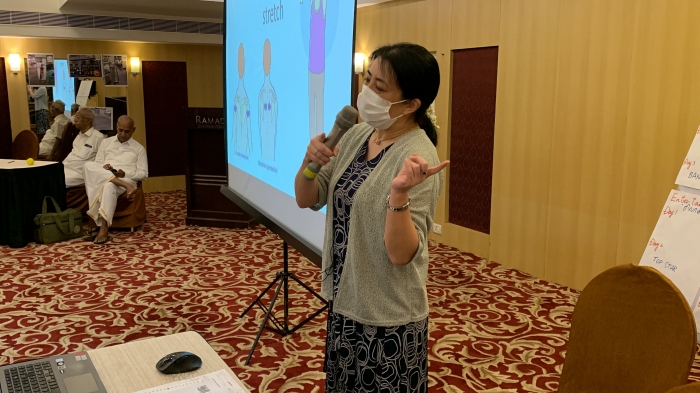INTUC/JILAF Industrial Relations Seminar in India
From December 20-21, the Japan International Labour Foundation (JILAF), together with the Indian National Trade Union Congress (INTUC), held an industrial relations seminar in Chennai, India. The seminar was attended by sixty two people, including the leaders of trade unions nationwide.
At the beginning of the seminar, V.R. Jaganathan, the President of Tamil Nadu INTUC, started off by giving opening remarks stating, “Industrial relations in Japan and India are very different, but we can learn a lot from Japan’s experiences of industrial relations and JILAF’s program. This seminar also includes practical training, and I hope that it will help you to make improvements in industrial relations at workplaces.” Next, Takayuki Yagi, the Executive Director General of JILAF, touched on the long-standing cooperative relationship between INTUC and JILAF, and stated, “Building constructive industrial relations will lead to the actualisation of decent work and social and economic development through the stabilisation of employment and protection of rights of workers, who are under difficult circumstances, including the impact of COVID-19.” Afterwards, Consul Hajime Odagawa of the Consulate-General of Japan in Chennai spoke about his experiences with trade unions in his previous position, and expressed, “I hope you will work to prevent industrial disputes through the things you learn from this seminar.”
Following the opening of the seminar, President Jaganathan conducted an orientation for the program, after which JILAF Program Manager Takeru Kato gave an introduction to JILAF’s activities, with a focus on local projects in India.
Next, Executive Director General Yagi gave a presentation titled “Characteristics of Labour Movements in Japan,” in which he outlined matters such as (1) the structure of Japan’s trade union organisations, (2) the reality of labour-management negotiations, (3) relations with the government and National Diet, (4) RENGO’s organisational structure and union fees, and (5) the labour productivity movement and labour-management consultation system.
Continuing on, Jason Samuel, the Vice President ERM of TVS Motor Company Ltd., which is a motorcycle manufacturer in India, gave an overview of his company’s organisation and explained its industrial relations from the perspective of management. According to Samuel, industrial relations at the company are very good, and seven of its personnel were even sent to participate in the seminar. In addition, Samuel emphasised the importance of establishing a relationship of trust between labour and management, with the aim of creating a workplace where employees can work with peace of mind.
At the end of the first day, a group discussion was held under the topic of “Working Towards Building Constructive Industrial Relations.” During it, a number of matters were discussed such as (1) ensuring safe and secure working environments, (2) unions cooperating in efforts to improve productivity, and (3) enhancing employee benefits through negotiations between labour and management as a response to COVID-19.
On the second day, R. P. K Murugesan, the Working President of Tamil Nadu INTUC, reported on industrial relations in India from the perspective of unions. In particular, he stressed the need for unions to present a convincing justification in wage negotiations and the importance of repeated dialogue with union members.
Next, Occupational Safety and Health Expert Miwako Nagasu gave a lecture titled “Participatory Activities to Improve Workplace Environments,” in which she specifically explained (1) the results of the work environment improvement program in Chennai (improvement photos, analysis of survey results, etc.), (2) the poster-making activity that was carried out with the participation of workers in Jordan, and (3) the activity that the UNIDO (United Nations Industrial Development Organization) implemented for furniture makers in Lebanon.
Afterwards, the participants engaged in a checklist exercise, while looking at various workplace improvement photos that were pasted on the wall. They also carried out group discussions and presentations with a focus on good practices that lead to improving productivity at a low cost.
Following this, Expert Miwako Nagasu gave an explanation about the Occupational Safety and Health Management System (OSHMS) and the response to COVID-19. She then expressed that in order to reduce work-related accidents and continuously improve safety and health, it is important to establish safety and health policies at business sites and to ensure an environment where employees can participate in such matters.
At the end, Program Manager Takeru Kato gave an explanation about the “transportation and storage of materials,” which are technical areas of improving workplace environments. This was followed by group discussions and presentations. To conclude the two-day industrial relations seminar, examples of improvement in Chennai were presented, then a message was given emphasizing that workers can prevent unnecessary work-related accidents by transporting materials in a simple and safe manner.



